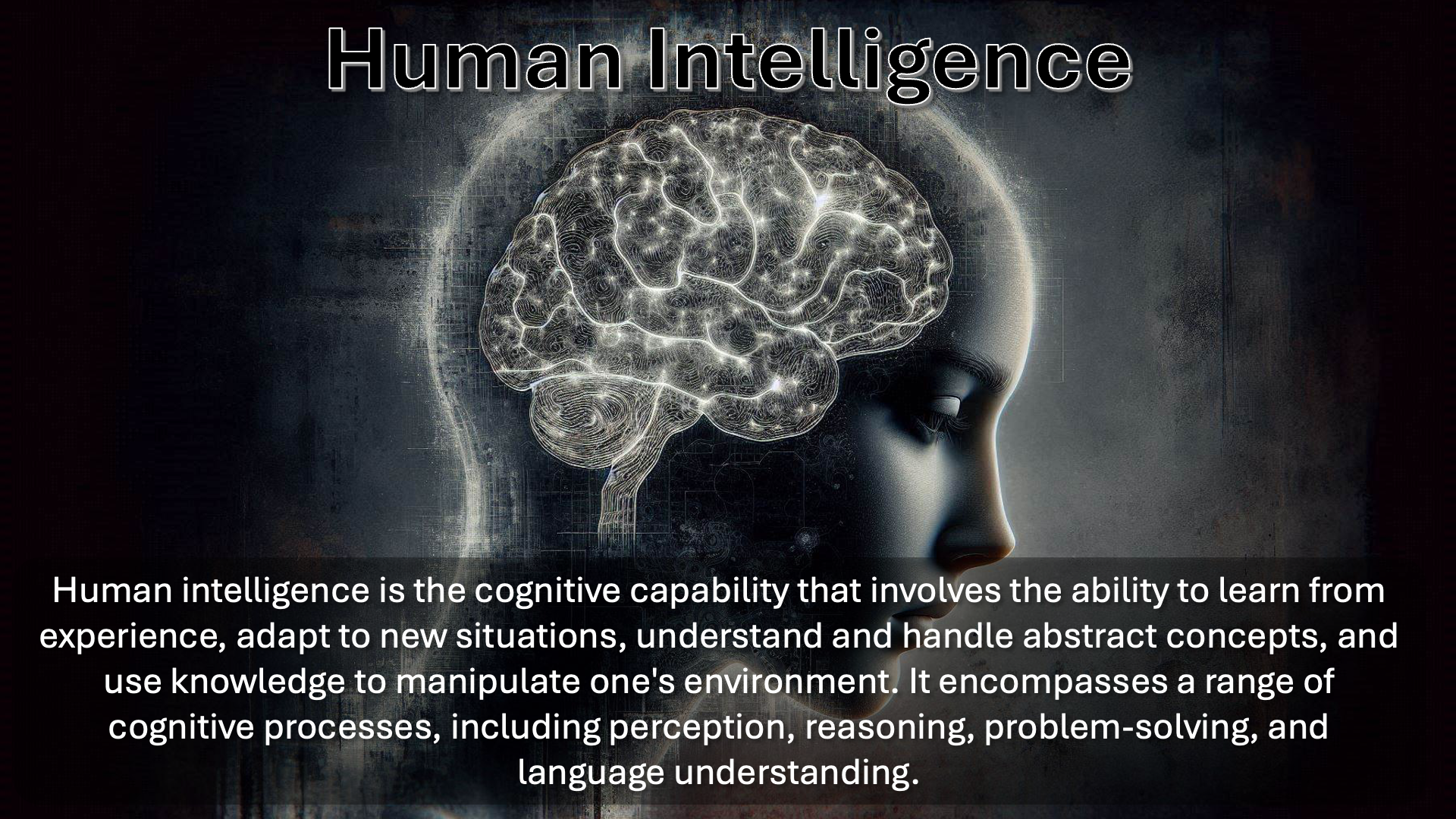Human Intelligence
Human intelligence is the complex ability of humans to learn from experience, adapt to new situations, understand and handle abstract concepts, and use knowledge to manipulate one's environment.
What is Human Intelligence?
Human intelligence is a multifaceted mental quality that encompasses the ability to learn from experience, adapt to new situations, understand and handle abstract concepts, and use knowledge to manipulate one's environment. It is not merely a cognitive or mental process but a selective combination of cognitive processes directed towards effective adaptation. This complex capability allows humans to engage in a wide range of cognitive activities, such as reasoning, problem-solving, and planning. Intelligence enables humans to recognize patterns, innovate, make decisions, retain information, and communicate through language. While there are various theories and measures of intelligence, including IQ tests, the essence of human intelligence lies in its adaptive nature and its role in human evolution and daily survival.- Snippet from Wikipedia: Human intelligence
Human intelligence is the intellectual capability of humans, which is marked by complex cognitive feats and high levels of motivation and self-awareness. Using their intelligence, humans are able to learn, form concepts, understand, and apply logic and reason. Human intelligence is also thought to encompass their capacities to recognize patterns, plan, innovate, solve problems, make decisions, retain information, and use language to communicate.
There are conflicting ideas about how intelligence should be conceptualized and measured. In psychometrics, human intelligence is commonly assessed by intelligence quotient (IQ) tests, although the validity of these tests is disputed. Several subcategories of intelligence, such as emotional intelligence and social intelligence, have been proposed, and there remains significant debate as to whether these represent distinct forms of intelligence.
There is also ongoing debate regarding how an individual's level of intelligence is formed, ranging from the idea that intelligence is fixed at birth to the idea that it is malleable and can change depending on a person's mindset and efforts.
Human Intelligence (HUMINT)
- Human intelligence (intelligence gathering) - Wikipedia —wikipedia.org
- A Guide to Human Intelligence (HUMINT) —greydynamics.com
- Human intelligence (HUMINT), refers to the collection, processing, analysis, and dissemination of information gathered from human sources…
Related:
- Tags: intelligence, human
External links:
- https://www.sciencedirect.com/topics/psychology/human-intelligence —sciencedirect.com
- Human intelligence - Cognitive Theories | Britannica —britannica.com
- Human intelligence - Cognitive Theories: During the era dominated by psychometric theories, the study of intelligence was influenced most by those investigating individual differences in people’s test scores. In an address to the American Psychological Association in 1957, the American researcher Lee Cronbach, a leader in the testing field, decried the lack of common ground between psychologists who studied individual differences and those who studied commonalities in human behaviour. Cronbach’s plea to unite the “two disciplines of scientific psychology” led, in part, to the development of cognitive theories of intelligence and of the underlying processes posited by these theories. (See also pedagogy: cognitive theories.)
-
- Human intelligence, mental quality that consists of the abilities to learn from experience, adapt to new situations, understand and handle abstract concepts, and use knowledge to manipulate one’s environment. Learn more about human intelligence, including various theories.
-
- Human brains are bigger than those of our primate relatives, but evidence from extinct human ancestors suggests brain size isn't everything.
- Human intelligence: why are we the smartest primates? —theconversation.com
- Intelligence is our most complex characteristic. Some would even say it defines us, setting us apart from other primates. And now, a new study – published this week by Hennady P. Shulha and colleagues…
- Evolution of human intelligence - Wikipedia —wikipedia.org
- Outline of human intelligence - Wikipedia —wikipedia.org
## ToDo ##
- Support Us... →
- Outline of human intelligence - Wikipedia —wikipedia.org
- UX and Human Intelligence
- Humanistic intelligence
Human Intelligence Traits and Aspects:
In Groups:
- Collective Intelligence
- Collective Wisdom
- Common Sense
- Collaborative Intelligence
- Distributed Cognition
- Group Dynamics
- Team Synergy
In Individuals:
- Abstract Thought
- Creativity
- Emotional Intelligence
- Fluid and Crystallized Intelligence
- Knowledge
- Learning
- Malleability of Intelligence
- Memory
- Working Memory
- Moral Intelligence
- Problem Solving
- Reaction Time
- Reasoning
- Risk Intelligence
- Social Intelligence
- Communication
- Spatial Intelligence
- Spiritual Intelligence
- Understanding
- Verbal Intelligence
- Visual Processing
- Analytical Intelligence
- Cognitive Flexibility
- Decision-Making
- Executive Function
- Intuition
- Metacognition
- Numerical Intelligence
- Perceptual Speed
- Practical Intelligence
- Self-Awareness
- Sensory Processing
- Systems Thinking
Simalar topics:
- Artificial Intelligence
- Cognitive Psychology
- Emotional Intelligence
- Neurobiology of Intelligence
- Learning and Memory
- Theories of Intelligence
- Intelligence Testing and Measurement
- Social Intelligence
- Intelligence in Animals
- The Impact of Culture on Intelligence
